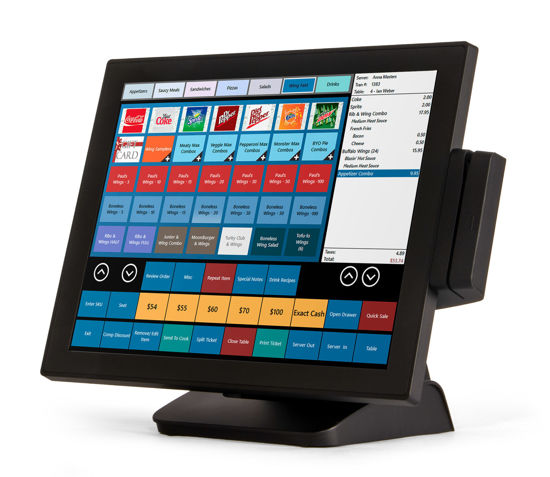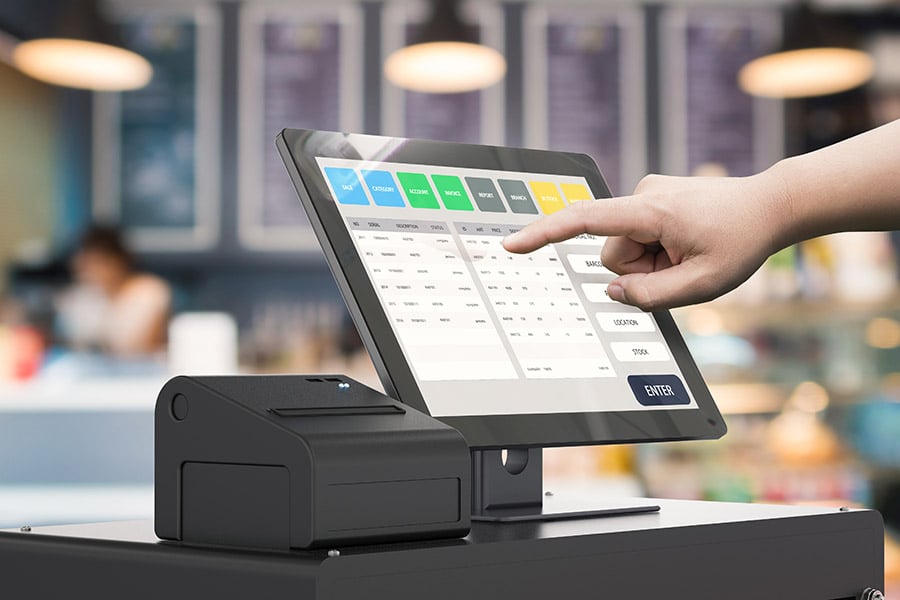Examine This Report on Point Of Sale

Clover POS: Retail Point-Of-Sale Solutions Streamline Deals
Pos Machine Things To Know Before You Buy

Hardware Components of a Point of Sale System What makes a POS system tick? It's not simply software; the hardware plays a starring function. Think about it as the body to the software application's brain. Without the best hardware, even the most sophisticated POS software is just a pretty face. Vital POS Hardware So, what are the must-haves? Let's break it down. The central processing system, typically a computer or tablet, is the heart of the operation. The display or touchscreen show allows personnel to connect with the system. A barcode scanner accelerate the checkout procedure. Remember the days of by hand entering each code? The dependable receipt printer offers consumers with a record of their purchase. A money drawer keeps your money safe and organized. A card reader allows consumers to pay with credit or debit cards. Diving Deeper: Beyond the Fundamentals But wait, there's more! Depending on your company, you may need specific hardware. For instance, a dining establishment may incorporate cooking area printers to relay orders, while a store may utilize label printers for item tagging. Ever question how your regional bakeshop instantly prints those delicious-looking labels? Selecting the Right Hardware: A Balancing Act Choosing the right hardware isn't practically buying the most pricey equipment. It has to do with finding the sweet spot between performance, sturdiness, and budget. A little service just starting might decide for a more standard setup, while a high-volume merchant will require robust, high-performance makers. get more info Is it better to purchase brand-new or utilized? Consider your alternatives thoroughly. A brand-new system offers the current technology and warranty defense, however a refurbished system can conserve you cash. The Future of POS Hardware What does the future hold? Anticipate to see much more combination with mobile phones, biometric scanners for worker authentication, and advanced analytics dashboards displayed on larger, clearer screens. Imagine a world where stock is instantly upgraded in real-time as products are scanned-- a world where you can track your very popular item from anywhere in the world. The possibilities are limitless, and the hardware is continuously evolving to meet the demands of today's organizations. Are you prepared to update your point of sale system?
Software Application Features and Capabilities: The Heart of Your POS System
Ever see a seasoned barista slide through a busy morning rush? Their secret isn't simply caffeine; it's a smooth dance with their POS system. The software is the conductor of your service symphony, managing whatever from sales to inventory. What notes should you be listening for? What abilities really matter in today's market?
Stock Management: Beyond Counting Beans
Forget spreadsheets that haunt your dreams. Modern POS systems use real-time inventory tracking, signaling you when your stock of artisanal coffee beans dips precariously low. Consider it as a digital guardian angel, avoiding those uncomfortable "Sorry, we're out!" moments to consumers. What if you could also forecast need based on historic data? Lots of systems now use forecasting tools, a powerful weapon against overstocking and lost sales. This helps prevent the situation of running out of popular products or building up excess inventory of slow-moving items, both of which can constrain capital and space.
Sales Reporting and Analytics: Deciphering the Data
Sales data is the brand-new gold, and your POS system is the miner. Forget feeling in one's bones how much you sold today. Dive deep into the data to reveal patterns, identify your very popular items, and understand consumer habits. Which menu product sets completely with the everyday special? Which promo resonated most with your clients? These insights are not simply intriguing; they're actionable intelligence. Without trustworthy sales reporting, browsing the complexities of organization decision-making ends up being like sailing without a compass, increasing the possibility of missteps and missed out on chances.
Consumer Relationship Management (CRM): Building Bridges, Not Walls
Remembering a routine consumer's name and favorite order is lovely, however scaling that personal touch is difficult. POS systems with CRM capabilities enable you to track client purchase history, choices, and even birthdays. Think of automatically offering a discount rate on their birthday-- a small gesture that fosters commitment and motivates repeat business. However there is the prospective snag of bad data quality, which can cause unreliable client profiles and ineffective marketing efforts.
Payment Processing: Enhancing the Transaction
The checkout experience can make or break a sale. Smooth combination with different payment methods-- credit cards, mobile wallets, even copyright-- is non-negotiable. Can your system manage split payments? Does it offer protected tokenization to protect customer information? A cumbersome payment process is like striking a sour note in your company symphony, possibly interrupting the whole performance. Ensuring compatibility with evolving payment innovations and adherence to security standards are critical for maintaining client trust and operational effectiveness.
Employee Management: Keeping the Group in Sync
From clocking in and out to managing permissions and tracking efficiency, staff member management includes enhance operations and improve responsibility. Is scheduling a headache? Many POS systems provide incorporated scheduling tools, enhancing staffing levels based on predicted demand. A common barrier that is typically ignored is the difficulty of integrating worker management performances with payroll systems, which can result in errors and ineffectiveness in wage computations.
Advanced Features: Leveling Up Your Operations
- Table Management: Ideal for restaurants, this function permits you to picture your dining room, track table status, and manage reservations.
- Commitment Programs: Reward your best consumers and motivate repeat organization with incorporated commitment programs.
- Online Ordering Combination: Perfectly incorporate your POS system with online ordering platforms to expand your reach.
Choosing the right POS system has to do with more than just performance; it has to do with discovering a partner that can grow with your company. Consider your present needs, expect future development, and don't be scared to ask the difficult concerns. The best software application can transform your organization from a chaotic cacophony into a harmonious masterpiece.
Industry-Specific POS System Applications
Consider the local pastry shop, bustling with early morning consumers yearning fresh croissants. A generic POS system might deal with transactions, however can it manage intricate recipes, track active ingredient inventory, or immediately adjust production schedules based upon sales information? Probably not. That is where the beauty of industry-specific POS systems shines.
Dining establishments and Hospitality
For busy dining establishments, speed and precision are critical. How lots of times have you seen servers handling orders, modifications, and splitting expenses, all while trying to provide exceptional service? A dining establishment POS system streamlines these processes, enabling for table management, kitchen area order tickets, and even online purchasing integration. These systems typically consist of functions like ingredient-level inventory tracking, essential for managing food expenses and decreasing waste. Ever question why your favorite meal is sometimes not available? It may stem from an absence of correct inventory management.
- Table Management
- Cooking Area Order Tickets
- Online Buying Integration
- Ingredient-Level Inventory Tracking
Retail Solutions
Retail, with its varied inventory and consumer interactions, requires a different set of tools. Envision a shop clothes store having a hard time to monitor sizes, colors, and seasonal collections utilizing a standard checkout system. An industry-specific retail POS system offers functions like barcode scanning, client commitment programs, and detailed sales reporting. These systems can even incorporate with e-commerce platforms, supplying a seamless omnichannel experience for consumers. Did you know some retail POS systems can predict future sales trends based on historic information? Now that is effective!
The Perils of an Inequality
Picking the wrong POS system can create significant functional obstacles. A clothing store utilizing a restaurant POS, for instance, would discover it unsuitable for managing stock with sizes and colors. The lack of correct reporting and analytics might result in misinformed buying decisions and lost earnings. The outcome could be similar to trying to fit a square peg in a round hole.
Secret Factors to consider
Selecting an industry-specific POS system requires careful assessment. Think of your business's special requirements and operational workflows. Does the system integrate with existing software application? Does it offer the necessary reporting abilities? Is it scalable to accommodate future development? A well-chosen POS system is not simply a deal tool; it's a strategic property that can drive efficiency, enhance client satisfaction, and eventually, boost your bottom line. Keep in mind, it is an investment in your business's future, not just an expense.
Security Considerations for Point of Sale Systems
Ever heard the tale of the mom-and-pop shop that lost whatever because of a single, neglected security defect in their POS system!.?. !? It's a cautionary tale, and it highlights a critical aspect frequently overshadowed by the attraction of fancy features and structured operations. The truth is, a POS system is just as great as its security. What great is a system that crunches numbers in a flash if it permits crooks to swipe customer's information simply as quickly?
The Vulnerability Minefield
The digital landscape is a battlefield. Every POS system, regardless of size or sophistication, is a potential target. Are you genuinely prepared for the dangers hiding around the corner? The real pinch comes when you discover that your outdated software has a gaping hole that hackers can exploit, turning your business into an unwitting accomplice in identity theft. The problem is that hackers are crafty and are constantly altering their techniques.
Common Security Gaps and Expert Tips
- Weak Passwords: "Password123" isn't cutting it. Use strong, special passwords for all POS system accounts and change them regularly. Two-factor authentication is a must.
- Unsecured Networks: Your Wi-Fi resembles leaving the front door open. Protect your network with strong encryption (WPA3 if possible) and think about a different network for your POS system.
- Outdated Software Application: Software application vendors patch security holes all the time. Stopping working to update is like welcoming difficulty. Set up automated updates or schedule routine upkeep.
- Staff member Training: Your personnel is your first line of defense. Train them to recognize phishing efforts, protect passwords, and report suspicious activity.
Data Encryption: Your Guard Versus the Dark Arts
Consider information encryption as a secret code. It scrambles delicate info, like charge card numbers, making it unreadable to unauthorized users. Without file encryption, your consumers' financial information are like sitting ducks, ripe for the selecting by cybercriminals. It's not practically safeguarding your consumers; it's about protecting your reputation and preventing large fines.
PCI Compliance: The Rulebook You Can't Ignore
If you accept credit cards, you're bound by the Payment Card Market Data Security Requirement (PCI DSS) It's a set of security standards designed to protect cardholder data. Stopping working to comply can lead to fines, penalties, and even the loss of your capability to process credit card payments. It's a headache, yes, but it's a necessary one. Believe of PCI compliance as the expense of doing business in the digital age.
Consider this: every deal processed through your point of sale is a potential entry point for destructive stars. By implementing robust security measures, you're not just safeguarding your business; you're safeguarding your consumers' trust and ensuring the long-lasting viability of your operations. The security of your POS system isn't simply a technical concern; it's a company crucial. It requires continuous caution, proactive measures, and a dedication to staying ahead of the curve.